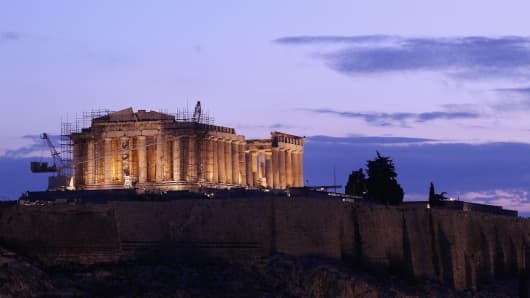Do you hear Washington's heavy breathing down the Europeans' necks?
Following up on President Obama's earlier warnings, the White House called on Europeans last Friday to prevent Greece's default, and to set up conditions for the country's sustainable economic growth. A day later, the U.S. Secretary of the Treasury Jacob J. Lew reiterated the same call. You can imagine what is going on behind closed doors.
Greece's NATO partners seem to have finally realized that a warm welcome the Prime Minister Tsipras received last week during the St. Petersburg Economic Forum in Russia (his second visit to Russia since taking office in January) was going a bit beyond the usual negotiating theater with intransigent creditors. The Kremlin promised help whenever Greece might ask for it, Russia agreed to finance a $2 billion gas pipeline connecting the 'Turkish stream' to the Greek hub, and Athens was invited to become a full member of the BRICS Development Bank scheduled to begin operations on July 7, 2015.
Closely tied to this extraordinary offer, China is looming with investments in Greece's two largest ports of Piraeus and Thessaloniki, where China Ocean Shipping Company (COSCO) already handles most of the cargo traffic. That is part of China's Maritime Silk Road, planned to connect to Central and Western Europe via a high-speed rail link originating in Greece.
Read MoreFears over Greece mount as talks collapse
It is about time for Europeans to stop their weekly announcements of the "last chance" negotiating sessions. Greece needs an agreement to end its economic and financial nightmare. Getting Greece back on a path of sustainable economic growth is the only way the country will be able to control its public sector accounts and to finance debt obligations in an orderly fashion.
Investment thoughts
Greece will strike up a passable deal with its creditors.
Hedge funds' investments at the time of a large excess supply of Greek assets will be hugely profitable. Their European fiesta will continue. These bad policy-seekers will keep thriving on Europe's apparent inability to fix its economies.
Growth-enhancing investments – domestic and foreign – in the euro area require the end to crisis management improvisations. The monetary union's fiscal and monetary management must be strengthened to provide a stable and predictable economic and political environment. Unforgivable waste of enormous resources in the Greek case shows the urgency of such a change.
Sadly, I don't see that happening, because such changes imply a degree of sovereignty transfers the nation states don't seem ready to concede.
The hedge funds know it, but the rest of the investment community should be reminded of this: the ECB is the only stable point of policy reference for the euro area.
Michael Ivanovitch is president of MSI Global, a New York-based economic research company. He also served as a senior economist at the OECD in Paris, international economist at the Federal Reserve Bank of New York and taught economics at Columbia.






